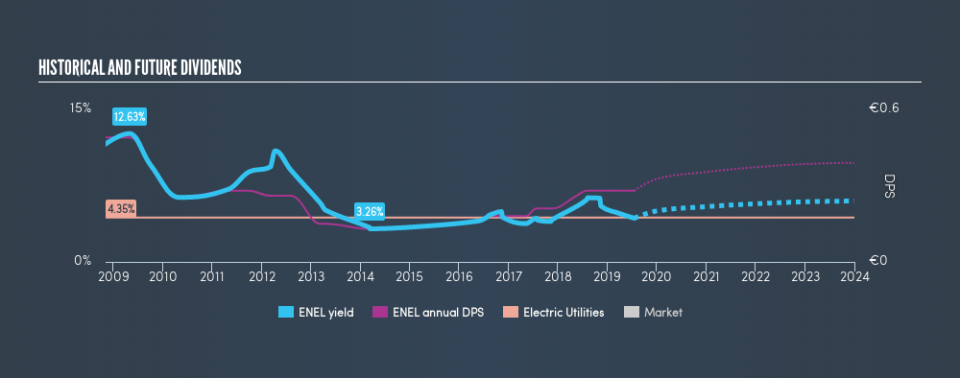It Might Be Better To Avoid Enel SpA's (BIT:ENEL) Upcoming 2.1% Dividend

Want to participate in a short research study? Help shape the future of investing tools and you could win a $250 gift card!
Enel SpA (BIT:ENEL) is about to trade ex-dividend in the next 3 days. If you purchase the stock on or after the 22nd of July, you won't be eligible to receive this dividend, when it is paid on the 24th of July.
Enel's next dividend payment will be €0.14 per share, and in the last 12 months, the company paid a total of €0.28 per share. Last year's total dividend payments show that Enel has a trailing yield of 4.3% on the current share price of €6.513. We love seeing companies pay a dividend, but it's also important to be sure that laying the golden eggs isn't going to kill our golden goose! So we need to investigate whether Enel can afford its dividend, and if the dividend could grow.
View our latest analysis for Enel
Dividends are usually paid out of company profits, so if a company pays out more than it earned then its dividend is usually at greater risk of being cut. Enel is paying out an acceptable 58% of its profit, a common payout level among most companies. Yet cash flows are even more important than profits for assessing a dividend, so we need to see if the company generated enough cash to pay its distribution. Over the past year it paid out 151% of its free cash flow as dividends, which is uncomfortably high. We're curious about why the company paid out more cash than it generated last year, since this can be one of the early signs that a dividend may be unsustainable.
Enel paid out less in dividends than it reported in profits, but unfortunately it didn't generate enough cash to cover the dividend. Were this to happen repeatedly, this would be a risk to Enel's ability to maintain its dividend.
Click here to see the company's payout ratio, plus analyst estimates of its future dividends.
Have Earnings And Dividends Been Growing?
Businesses with strong growth prospects usually make the best dividend payers, because it's easier to grow dividends when earnings per share are improving. Investors love dividends, so if earnings fall and the dividend is reduced, expect a stock to be sold off heavily at the same time. With that in mind, we're encouraged by the steady growth at Enel, with earnings per share up 7.0% on average over the last five years.
Many investors will assess a company's dividend performance by evaluating how much the dividend payments have changed over time. Enel has seen its dividend decline 5.4% per annum on average over the past 10 years, which is not great to see. It's unusual to see earnings per share increasing at the same time as dividends per share have been in decline. We'd hope it's because the company is reinvesting heavily in its business, but it could also suggest business is lumpy.
To Sum It Up
From a dividend perspective, should investors buy or avoid Enel? Earnings per share have grown somewhat, although Enel paid out over half its profits and the dividend was not well covered by free cash flow. Bottom line: Enel has some unfortunate characteristics that we think could lead to sub-optimal outcomes for dividend investors.
Ever wonder what the future holds for Enel? See what the 20 analysts we track are forecasting, with this visualisation of its historical and future estimated earnings and cash flow
If you're in the market for dividend stocks, we recommend checking our list of top dividend stocks with a greater than 2% yield and an upcoming dividend.
We aim to bring you long-term focused research analysis driven by fundamental data. Note that our analysis may not factor in the latest price-sensitive company announcements or qualitative material.
If you spot an error that warrants correction, please contact the editor at editorial-team@simplywallst.com. This article by Simply Wall St is general in nature. It does not constitute a recommendation to buy or sell any stock, and does not take account of your objectives, or your financial situation. Simply Wall St has no position in the stocks mentioned. Thank you for reading.


